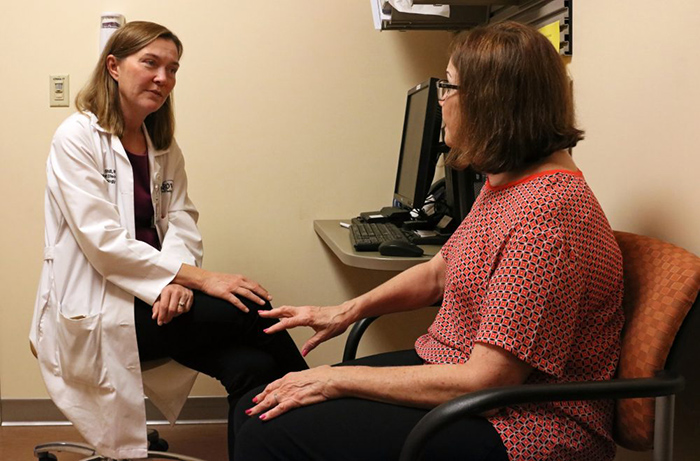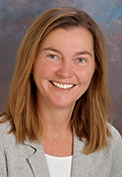
Faculty Spotlight: Holly Shill, MD

Throughout their eight years of study, any graduating medical student has envisioned their future career as a medical professional with the hope that one day they will secure their dream job. Although the process can be difficult, enduring long hours and sleepless nights, some individuals achieve this very goal.

“This has been my ultimate goal,” she said, “I’ll be here until I retire.”
Dr. Shill knew in high school that she wanted to pursue a career in medicine. After researching and interviewing at various schools, she realized she had a “great institution” in her own backyard, the University of Arizona. Dr. Shill received scholarships and grants to attend the University, where she later attained her bachelor’s degree in electrical engineering in addition to a medical degree at the College of Medicine – Tucson in 1995.
The idea of supporting local residents through grants and scholarships resonated well with Dr. Shill, which helped her cement her relationship with the College; and it was a relationship that would soon blossom, as she became more involved in the institution as a mentor and research associate professor in the Department of Neurology in 2013 — a position she still holds today.
“It’s wonderful interacting with medical students because I know what they’re going through,” Dr. Shill said. “I’ve been there.”
Dr. Shill has come full circle at Barrow; she started as a resident in 1996 and was also a fellow there in 1999. She left to attend a fellowship at the National Institutes of Health and to take the position as director at the Sun Health Research Institute in Sun City, Ariz. in 2006.
“I’m really enjoying being back at Barrow and the Muhammad Ali Parkinson Center,” Dr. Shill said. “I’m proud to be part of the most comprehensive Parkinson’s disease treatment center in the nation.”
Dr. Shill has worked on a variety of different research studies that look at the aspects of Parkinson’s at advanced and early stages. She decided to specialize in Parkinson’s disease because she liked building relationships with current patients and their families.
“I wanted to get into Parkinson’s specifically because of the interaction with patients and their family,” she said. “You really get to know the people, and there are many treatment options, which gives them hope for their future.”
When asked what her advice for current medical students would be, Dr. Shill emphasized the importance of following their dreams and investing their efforts into pursuing what they are passionate about.
“For future medical students, it’s important to not only find something you’re good at, but also follow your heart because medicine is a long career,” Dr. Shill said.
Topics
About the College
Founded in 2007, the University of Arizona College of Medicine – Phoenix inspires and trains exemplary physicians, scientists and leaders to advance its core missions in education, research, clinical care and service to communities across Arizona. The college’s strength lies in our collaborations and partnerships with clinical affiliates, community organizations and industry sponsors. With our primary affiliate, Banner Health, we are recognized as the premier academic medical center in Phoenix. As an anchor institution of the Phoenix Bioscience Core, the college is home to signature research programs in neurosciences, cardiopulmonary diseases, immunology, informatics and metabolism. These focus areas uniquely position us to drive biomedical research and bolster economic development in the region.
As an urban institution with strong roots in rural and tribal health, the college has graduated more than 1,000 physicians and matriculates 130 students each year. Greater than 60% of matriculating students are from Arizona and many continue training at our GME sponsored residency programs, ultimately pursuing local academic and community-based opportunities. While our traditional four-year program continues to thrive, we will launch our recently approved accelerated three-year medical student curriculum with exclusive focus on primary care. This program is designed to further enhance workforce retention needs across Arizona.
The college has embarked on our strategic plan for 2025 to 2030. Learn more.